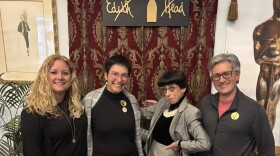Twenty-one years ago, cancer researcher Steven Rosenberg announced he'd found a new way to treat cancer. He showed he could successfully treat patients with advanced kidney cancer or advanced melanoma using cells from the patient's own immune system. He published his results in the New England Journal of Medicine.
"It only worked about 15 percent of the time," Rosenberg says, "But what it did show, is that it was possible to use the body's immune system to cause cancer regression; it could happen."
Rosenberg and his colleagues at the National Cancer Institute in Bethesda, Md., have spent the last two decades tweaking their technique, trying to make it more effective.
One major problem with Rosenberg's original approach is that not everybody has cells in their immune systems that will react when they see their own cancer, and do their thing to kill it. Rosenberg now thinks he's solved that problem.
"We no longer need to find cells from each individual patient that can kill the cancer...we can create them in the laboratory," Rosenberg says.
The explanation for how they do that appears in the journal Science.
Rosenberg found a way to genetically alter a particular kind of immune cell, called a T-cell, so any patients' T-cells would recognize the cancer.
Philip Greenberg says the approach makes sense. Greenberg, who is at the University of Washington in Seattle, has been working on similar approaches to fighting cancer. He says Rosenberg's latest work is encouraging -- but not terribly surprising.
"Work in animal models showed the approach would work," Greenberg says. "And biologically it should work. The issue is really to solve the problems that are inherent in this approach to make it generally useful."
It's hard to make genetically altered cells that will do what you want. So far, the new technique has only been tried on patients with melanoma. And only two of Rosenberg's 17 patients got better. Rosenberg's approach also requires a lot of laboratory work for each patient, which means a high cost.
Keith Knutson is also working on using the immune system to fight cancer. Knutson is at the Mayo clinic in Rochester, Minn. He says Rosenberg is able to try his labor-intensive technique because he has the resources of the National Institutes of Health behind him.
"You won't see this advancing outside of the NIH because of the high cost associated with it," Knutson says.
And it's always possible that Rosenberg's approach simply won't work when it's tested in more patients. The world of cancer treatment is littered with promising experimental results that didn't pan out, something Rosenberg is well aware of. He likes to tell an anecdote about a 58-year-old radiologist with advanced melanoma. Rosenberg met the doctor-turned-patient when he was testing an earlier version of his immunotherapy.
"I sat down with this fellow, to get an informed consent, and I asked him if he wanted to receive the treatment, told him we had had some good results, in patients we had treated before, and was he interested in receiving it -- and he looked me straight in the eye and he said something I'll never forget. He said, "Absolutely, doc. I want to receive this new treatment while it's still working."
Luckily for the radiologist, the treatment was still working when he got it.
Copyright 2022 NPR. To see more, visit https://www.npr.org. 9(MDAzMjM2NDYzMDEyMzc1Njk5NjAxNzY3OQ001))






